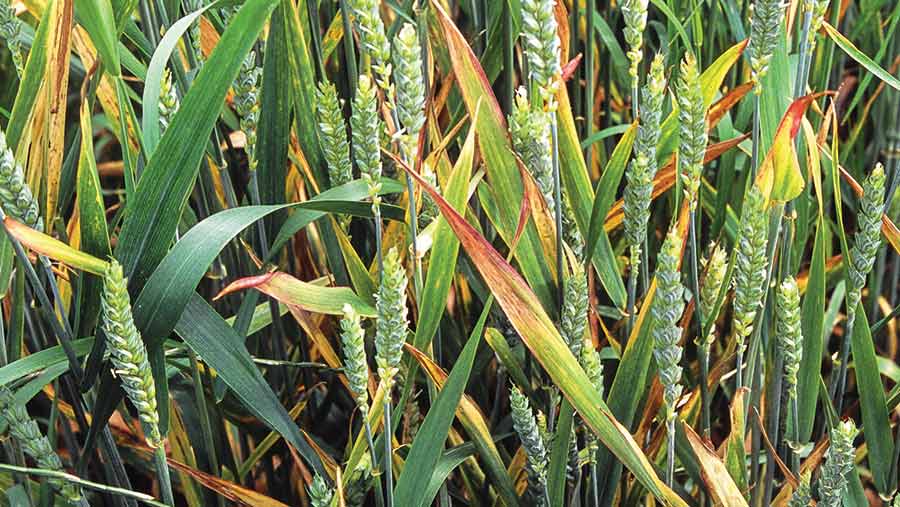Cereals face aphid threat despite onset of colder weather
 BYDV symptoms in wheat crop © Blackthorn Arable
BYDV symptoms in wheat crop © Blackthorn Arable Winter cereal growers face an increased risk of a key aphid-spread disease due to the mild autumn and seed dressings running out of steam unless there is a prolonged cold period of weather.
Aphid activity has been high this autumn, meaning they could be infecting crops with barley yellow dwarf virus (BYDV) which in extreme cases can cut winter wheat yields by up to 60%.
Therefore, growers are being advised to examine crops to assess aphid numbers and then decide if the risk is high enough to use an insecticide, as seed dressings are only effective for about five to six weeks.
See also: Tips on managing BYDV in cereals without neonic seed treatments
Two main aphids – the bird cherry-oat and grain – spread the virus, and about 50% of the latter species shows resistance to the only insecticide spray treatment available, namely pyrethroids.
Final season
This is the final season that the popular seed treatment clothianidin (Deter) will be available, as this neonicotinoid insecticide will be banned from next season due to its perceived damage to bees.
Alan Dewar, independent entomologist, says crops most at risk will be those Deter-treated ones sown in September and the first two weeks in October, while any untreated crops will be at risk if they have not been sprayed.
“We will see BYDV appear in the spring despite Deter and spraying because of the resistance levels of the grain aphids,” he told Farmers Weekly.
Early drilling and mild winters encourage the aphid-spread disease, so many growers have been delaying drilling – which will also help with blackgrass control – and praying for some hard prolonged frost to kill off the aphids.
Dr Dewar advises growers to look for aphids in their crops – with any sunny weather encouraging them to fly. Pyrethroids are the only available spray treatment as Corteva Agriscience has yet to receive clearance for its new insecticide isoclast which is based on sulfoxaflor – a new class on chemistry.

David Taylor (left) and Mike Thornton
Colder weather
Alex Greenslade, entomologist at Rothamsted Research, says hard frosts are needed – and indeed colder weather is forecast later this week – to slow down the aphid build-up.
“The real issue is that in mild winters aphids will land on crops and move around and then we will see a large outbreak of BYDV next spring,” he said.
Todd Jex, adviser with agronomy group Agrii, who covers a high-risk area for BYDV in Dorset, says the risk will be higher this season. The county is particularly vulnerable to the disease due to its mild winters and big areas of grassland, hills and valleys for aphids to overwinter.
Some 90% of his clients are using Deter seed dressing on their winter cereals, and those close to the milder coastline and sheltered valley will be considering applying a pyrethroid spray, he says.
However, some who have applied multiple pyrethroid sprays on oilseed rape to control cabbage stem flea beetle with mixed results may be a little hesitant to rush into cereal crops.
“Many in more exposed sites will probably hold back and see what effect the forecast cold weather will have on aphid numbers,” he said.
Growers can use the AHDB’s BYDV management tool based on cumulative temperatures (T-sum) to assess the disease risk.
The AHDB says yield losses from BYDV on untreated winter wheat crops average 8%, but can be as high as 60%, and it estimates that if 82% of the crop area is affected it would cost £136m a year in lost yield. The disease also affects winter barley and oats.
Last season for seed dressing
Winter cereal growers have until 19 December to use the neonicotinoid insecticide clothianidin as a seed treatment before it is banned, due to the serious danger it poses to bees.
Clothianidin is the active ingredient in Deter seed dressing, which is aimed at controlling BYDV and can also deter slugs. Redigo Deter included the neonic plus the fungicide prothioconazole.
This neonic, along with two others – imidacloprid and thiamethoxam – have been banned for use as seed dressings in flowering crops such as oilseed rape since 2013, but now the ban for all three is being extended to other crops such as winter cereals and sugar beet.

